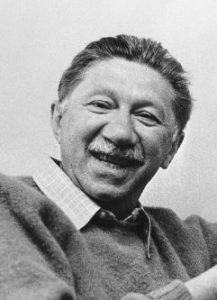Founder of Positive Psychology
 Abraham Harold Maslow (1908-1970) was born in Brooklyn to Jewish-Russian immigrant parents from Kiev. Maslow grew up in poverty and faced a great deal of antisemitism. He wasn’t happy at home either, and spent most of his time at the library reading. In high school, he was the editor of the school’s Latin and physics magazines. Maslow went on to study at City College of New York, and then took up psychology at the University of Wisconsin, where he did experiments and studies on primate behaviour. He moved on to Columbia University, where he worked with Alfred Adler, then taught at Brooklyn College and later at Brandeis University. After World War II, distraught by the Holocaust and the ravages of war, he switched his focus to mental health and human potential, founding a new branch of psychology called humanistic psychology, or positive psychology. The core idea behind humanistic psychology is that every person has the innate ability to grow, heal, and attain happiness and self-actualization. The job of the therapist is only to remove the obstacles that are holding a person back from achieving those goals. As Maslow described it: “Freud supplied us the sick half of psychology and we must now fill it out with the healthy half.” This inspired other psychologists and researchers like Carl Rogers, who pioneered client-centered therapy, and Martin Seligman, who coined “learned helplessness” and proposed Well-Being Theory. The most famous result of Maslow’s work was the Hierarchy of Needs, a pyramid that shows the five major necessities of a human being. At the bottom are the basic physiological needs which are most pressing, but provide the least happiness and satisfaction in the long term. At the top is self-actualization, living a harmonious life of purpose and meaning, which is the most difficult to attain but provides the highest degree of happiness and lasting satisfaction. In 1961, Maslow cofounded the Journal of Humanistic Psychology. His most popular book was The Psychology of Science, where he coined the well-known saying that “if all you have is a hammer, everything looks like a nail”. Maslow was voted Humanist of the Year in 1967, and has been ranked among the top 10 greatest and most-cited psychologists of all time.
Abraham Harold Maslow (1908-1970) was born in Brooklyn to Jewish-Russian immigrant parents from Kiev. Maslow grew up in poverty and faced a great deal of antisemitism. He wasn’t happy at home either, and spent most of his time at the library reading. In high school, he was the editor of the school’s Latin and physics magazines. Maslow went on to study at City College of New York, and then took up psychology at the University of Wisconsin, where he did experiments and studies on primate behaviour. He moved on to Columbia University, where he worked with Alfred Adler, then taught at Brooklyn College and later at Brandeis University. After World War II, distraught by the Holocaust and the ravages of war, he switched his focus to mental health and human potential, founding a new branch of psychology called humanistic psychology, or positive psychology. The core idea behind humanistic psychology is that every person has the innate ability to grow, heal, and attain happiness and self-actualization. The job of the therapist is only to remove the obstacles that are holding a person back from achieving those goals. As Maslow described it: “Freud supplied us the sick half of psychology and we must now fill it out with the healthy half.” This inspired other psychologists and researchers like Carl Rogers, who pioneered client-centered therapy, and Martin Seligman, who coined “learned helplessness” and proposed Well-Being Theory. The most famous result of Maslow’s work was the Hierarchy of Needs, a pyramid that shows the five major necessities of a human being. At the bottom are the basic physiological needs which are most pressing, but provide the least happiness and satisfaction in the long term. At the top is self-actualization, living a harmonious life of purpose and meaning, which is the most difficult to attain but provides the highest degree of happiness and lasting satisfaction. In 1961, Maslow cofounded the Journal of Humanistic Psychology. His most popular book was The Psychology of Science, where he coined the well-known saying that “if all you have is a hammer, everything looks like a nail”. Maslow was voted Humanist of the Year in 1967, and has been ranked among the top 10 greatest and most-cited psychologists of all time.
Archaeologists Discover Tablet with Earliest Mention of God’s Name
10 Facts You Should Know About Ruth
Words of the Week
Of all tyrannies, a tyranny sincerely exercised for the good of its victims may be the most oppressive. It would be better to live under robber barons than under omnipotent moral busybodies. The robber baron’s cruelty may sometimes sleep, his cupidity may at some point be satiated; but those who torment us for our own good will torment us without end for they do so with the approval of their own conscience.
– CS Lewis

